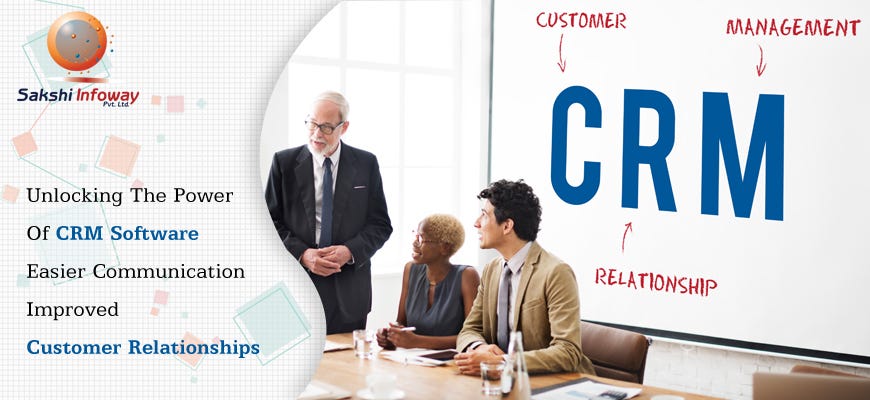CRM software centralizes customer data, automates sales processes, enables effective team communication and collaboration, improves customer relationships, and increases sales productivity. Managing customer relationships is crucial for businesses to drive growth and remain competitive in today’s digital era.
CRM software simplifies this process by providing a centralized database for storing and managing customer data, including contact details, purchase history, and preferences. Additionally, it automates sales processes, such as lead generation, pipeline management, and follow-ups, streamlining the sales cycle.
Moreover, CRM software facilitates effective team communication and collaboration by providing real-time updates, task assignments, and shared calendars. This comprehensive approach enables businesses to nurture and deepen customer relationships, increasing sales productivity, customer satisfaction, and business success.
Understanding The Basics Of CRM Software
CRM software, or Customer Relationship Management software, is a powerful tool businesses use to manage and analyze customer interactions and data throughout the customer lifecycle. It enables companies to improve customer service, enhance sales effectiveness, and strengthen customer relationships.
CRM software allows businesses to centralize customer information in a single database, such as contact details, purchase history, and preferences. This organized data is valuable for sales, marketing, and customer support teams. By accessing this information, businesses gain insights into customer behavior and needs, enabling them to personalize their approach and provide targeted solutions.
Key features of CRM software include contact management, lead and opportunity tracking, sales forecasting, and automated email marketing. These features streamline processes, improve collaboration, and increase organizational productivity.
CRM software brings numerous benefits to businesses, such as increased customer retention, improved customer satisfaction, enhanced sales performance, and better decision-making. It helps businesses to identify potential leads, track sales activities, and nurture relationships with existing customers.
Investing in a CRM system is essential for businesses seeking to optimize their customer relationships and drive business growth. By leveraging the capabilities of CRM software, businesses can gain a competitive edge in the market and create long-lasting customer loyalty.
Read more: How can I learn more about CRM?
The Inner Workings Of CRM Software
The inner workings of CRM software involve various processes and functionalities that help businesses streamline their customer relationship management. One crucial aspect is data collection and management, where the software captures and organizes valuable customer information, such as contact details, interactions, and purchase history. This allows businesses to have a centralized database that enables personalized communication and targeted marketing efforts.
Another important functionality is customer segmentation and profiling. CRM software utilizes the collected data to segment customers based on various criteria, such as demographics, purchase behavior, and interests. This segmentation helps businesses tailor their marketing campaigns and customer interactions to specific target groups, enhancing effectiveness and customer satisfaction.
Furthermore, CRM software facilitates automated lead capture and nurturing. It captures leads from various sources, such as website forms or social media, and automatically enters them into the CRM system. The software then nurtures these leads through automated communication workflows, such as sending personalized emails or reminders, guiding them through the customer journey.
Exploring The Sales And Marketing Functions Of Crm Software
CRM software is pivotal in streamlining and enhancing businesses’ sales and marketing functions. Sales pipeline management is a core feature of CRM systems, allowing businesses to track and manage their sales processes effectively. This includes monitoring leads, deals, and opportunities throughout the sales cycle, enabling sales teams to prioritize and take appropriate actions at every stage.
Furthermore, CRM software provides sales forecasting and analytics capabilities, enabling businesses to make informed decisions based on data-driven insights. By analyzing historical sales data, trends, and customer behaviors, companies can make accurate sales forecasts and identify potential areas for growth and improvement.
In addition to sales functions, CRM software also offers robust marketing campaign management features. Businesses can create, execute, and track marketing campaigns from within the CRM platform, gaining better visibility and control over their marketing efforts. This includes managing email campaigns, social media integrations, lead scoring, and performance metrics.
Unleashing The Power Of CRM Software For Customer Support
CRM software, short for Customer Relationship Management software, is a powerful tool for managing and optimizing customer support. By integrating a help desk and ticketing system, CRM software enables businesses to track and resolve customer issues efficiently. This integration streamlines the customer service workflow, automating repetitive tasks and allowing support agents to focus on more complex problems.
CRM software also offers a knowledge base and self-service features, empowering customers to find solutions independently. Businesses can reduce support ticket volume and improve customer satisfaction by providing easy access to FAQs, articles, and tutorials.
With CRM software, businesses can track customer interactions and gather valuable insights to enhance personalized customer experiences. By leveraging customer data, companies can tailor their offerings and communications to match individual preferences, increasing customer retention and loyalty.
In conclusion, CRM software is a centralized hub for managing customer support, integrating help desk and ticketing systems, automating workflows, and offering a knowledge base and self-service features. Its power lies in its ability to streamline customer support processes, empower customers with self-help options, and enable businesses to deliver exceptional customer experiences.
Integrating CRM Software With Other Business Tools
CRM software offers seamless integration with email and calendar tools. This integration allows you to synchronize your email communication and schedule with your CRM platform, ensuring that all-important customer conversations and appointments are captured and recorded. You can easily associate relevant messages and meetings with specific contacts or opportunities in your CRM system by linking your email and calendar functionalities. This integration streamlines your workflow, as you can access your CRM data directly from your email client and schedule meetings using your CRM platform.
CRM systems also enable integration with various social media platforms and communication channels. You can connect your social media accounts to your CRM software, allowing you to monitor and engage with customers directly from the CRM interface. This integration facilitates comprehensive customer interaction tracking, as you can capture social media conversations, comments, and messages within the CRM system. Combining social media data with customer profiles and activities gives you valuable insights into customer behavior and preferences.
One of the key advantages of CRM software is its ability to integrate with analytics and reporting tools. Connecting your CRM platform with data analytics software lets you generate meaningful reports and gain actionable insights from your customer data. This integration lets you track sales performance, customer engagement, and other key metrics in real time, empowering you to make data-driven decisions. Additionally, CRM analytics integration enables you to segment your customer base, identify trends, and personalize your marketing and sales efforts.

Credit: www.nem.net.au
The Future Of CRM Software: Trends And Innovations
CRM software is an essential tool for businesses in today’s digital age. With the advancements in technology, the future of CRM software is constantly evolving to meet the growing needs of organizations. One notable trend is integrating artificial intelligence (AI) and machine learning into CRM systems. AI-powered algorithms can analyze large volumes of customer data, providing valuable insights and predictions for improved decision-making. Another trend is the rise of mobile and cloud-based CRM solutions, which offer flexibility and accessibility for users on the go. These solutions enable businesses to access their CRM software from any device, anytime, anywhere. Personalization and enhanced user experience are becoming key features of CRM software. Businesses can build stronger relationships and drive customer loyalty by tailoring the CRM experience to individual customer needs. In conclusion, the future of CRM software holds exciting possibilities with AI, mobile and cloud-based solutions, and improved personalization.
Selecting The Right CRM Software For Your Business
CRM software is essential for businesses of all sizes to manage customer relationships effectively. When selecting the right CRM software for your business, consider the following factors:
- Features and functionality: Look for CRM software that offers the features and functionality that align with your business needs. Assess if it provides contact management, lead management, pipeline tracking, task management, and reporting capabilities.
- Scalability: Ensure that the CRM software can scale with your business as it grows. It should accommodate increasing users and a growing customer base without compromising performance.
- Integration: Check if the CRM software integrates seamlessly with your existing systems such as email, marketing automation, and sales tools. Integrations save time and effort by streamlining processes.
- User-friendliness: Opt for CRM software that is intuitive and easy to navigate. A user-friendly interface will encourage adoption by your team, ensuring efficient use and maximum benefit.
- Customization: Consider if the CRM software allows customization to fit your unique business processes and terminology. Customizable fields, workflows, and dashboards enhance productivity and effectiveness.
Several CRM software providers dominate the market. Some of the popular choices include:
| Provider | Key Features |
|---|---|
| Salesforce | Extensive customization options, strong integration capabilities, and AI-powered analytics. |
| HubSpot CRM | User-friendly interface, robust free version, seamless integration with HubSpot Marketing Platform. |
| Zoho CRM | Affordable pricing, a broad range of features, integration with other Zoho products. |
| Microsoft Dynamics 365 | Tight integration with Microsoft Office and Outlook, extensive customization options, multiple deployment options. |
Implementing CRM software successfully requires proper planning and execution. Consider the following tips:
- Define clear objectives: Clearly define and align your CRM goals with your overall business objectives.
- Get buy-in from stakeholders: Involve key stakeholders from different departments to ensure they support and actively participate in the CRM implementation process.
- Train your team: Provide comprehensive training to your team members to make them proficient with using the CRM software effectively.
- Gradual adoption: Roll out the CRM software gradually, starting with a pilot project or a specific department. This approach allows for better testing and implementation.
- Continuous evaluation: Regularly evaluate and refine your CRM implementation strategy to ensure it aligns with evolving business needs.
Frequently Asked Questions On How Does Crm Software Work?
How Does CRM Software Work?
CRM software consolidates customer data from different sources and organizes it into a centralized database. It helps businesses manage and analyze customer interactions, sales, marketing campaigns, and customer service. CRM software provides tools for lead management, contact management, email integration, reporting, and more.
It improves customer relationships and enables businesses to make data-driven decisions.
What Are The Benefits Of Using CRM Software?
Using CRM software offers numerous benefits, including improved customer relationships, enhanced sales productivity, streamlined communication, better customer service, increased efficiency, and accurate sales forecasting. It allows businesses to personalize customer experiences, automate repetitive tasks, track client interactions, and gain insights into customer behavior.
CRM software also facilitates team collaboration and helps businesses stay organized.
Can CRM Software Integrate With Other Systems?
Yes, CRM software can integrate with other systems, such as marketing automation, email marketing, social media, e-commerce, and customer service platforms. Integration allows seamless data flow between software applications, eliminating manual data entry and ensuring data consistency. By integrating CRM software with other systems, businesses can enhance marketing campaigns, automate processes, and provide a unified view of customer interactions across multiple channels.
Is CRM Software Suitable For Small Businesses?
Yes, CRM software suits small businesses as it helps them centralize customer data, improve communication, and streamline sales and customer service processes. It enables small businesses to efficiently manage and nurture leads, track customer interactions, and personalize marketing campaigns.
CRM software empowers small businesses to compete with larger enterprises by providing tools to build stronger customer relationships.
Conclusion
To sum up, CRM software is an essential tool for businesses of all sizes looking to streamline their customer management processes. CRM software empowers businesses to enhance customer relationships, boost sales, and improve overall efficiency by centralizing data, automating tasks, and providing valuable insights.
CRM software is an indispensable asset in today’s competitive business landscape with its user-friendly interface and customizable features. Embrace the power of CRM software and witness your business thrive.



